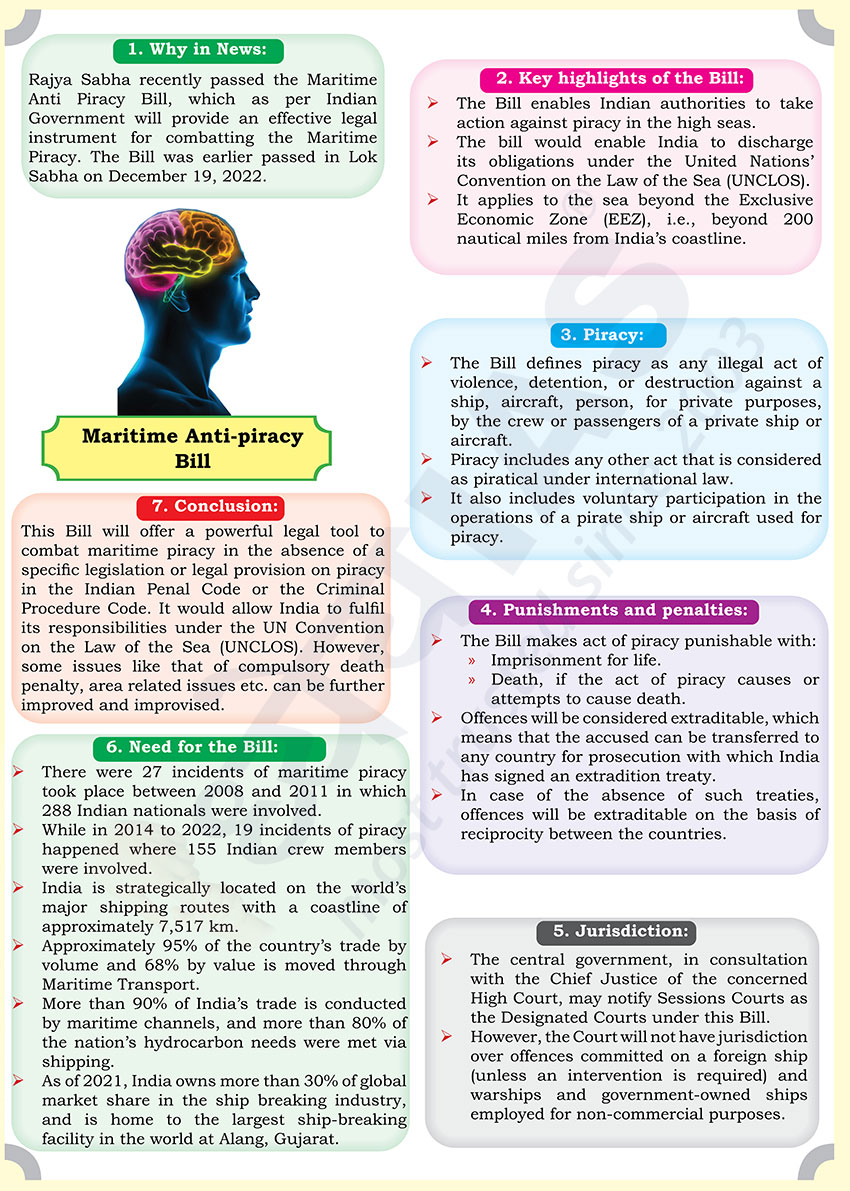Brain-booster /
11 Jan 2023
Brain Booster for UPSC & State PCS Examination (Topic: Maritime Anti-piracy Bill)

Why in News?
- Rajya Sabha recently passed the Maritime Anti Piracy Bill, which as per
Indian Government will provide an effective legal instrument for combatting
the Maritime Piracy. The Bill was earlier passed in Lok Sabha on December
19, 2022.
Key highlights of the Bill:
- The Bill enables Indian authorities to take action against piracy in the
high seas.
- The bill would enable India to discharge its obligations under the
United Nations’ Convention on the Law of the Sea (UNCLOS).
- It applies to the sea beyond the Exclusive Economic Zone (EEZ), i.e.,
beyond 200 nautical miles from India’s coastline.
Piracy:
- The Bill defines piracy as any illegal act of violence, detention, or
destruction against a ship, aircraft, person, for private purposes, by the
crew or passengers of a private ship or aircraft.
- Piracy includes any other act that is considered as piratical under
international law.
- It also includes voluntary participation in the operations of a pirate
ship or aircraft used for piracy.
Punishments and penalties:
- The Bill makes act of piracy punishable with:
- Imprisonment for life.
- Death, if the act of piracy causes or attempts to cause death.
- Offences will be considered extraditable, which means that the accused
can be transferred to any country for prosecution with which India has
signed an extradition treaty.
- In case of the absence of such treaties, offences will be extraditable
on the basis of reciprocity between the countries.
Jurisdiction:
- The central government, in consultation with the Chief Justice of the
concerned High Court, may notify Sessions Courts as the Designated Courts
under this Bill.
- However, the Court will not have jurisdiction over offences committed on
a foreign ship (unless an intervention is required) and warships and
government-owned ships employed for non-commercial purposes.
Need for the Bill:
- There were 27 incidents of maritime piracy took place between 2008 and
2011 in which 288 Indian nationals were involved.
- While in 2014 to 2022, 19 incidents of piracy happened where 155 Indian
crew members were involved.
- India is strategically located on the world’s major shipping routes with
a coastline of approximately 7,517 km.
- Approximately 95% of the country’s trade by volume and 68% by value is
moved through Maritime Transport.
- More than 90% of India’s trade is conducted by maritime channels, and
more than 80% of the nation’s hydrocarbon needs were met via shipping.
- As of 2021, India owns more than 30% of global market share in the ship
breaking industry, and is home to the largest ship-breaking facility in the
world at Alang, Gujarat.
Conclusion:
- This Bill will offer a powerful legal tool to combat maritime piracy in
the absence of a specific legislation or legal provision on piracy in the
Indian Penal Code or the Criminal Procedure Code. It would allow India to
fulfil its responsibilities under the UN Convention on the Law of the Sea (UNCLOS).
However, some issues like that of compulsory death penalty, area related
issues etc. can be further improved and improvised.








